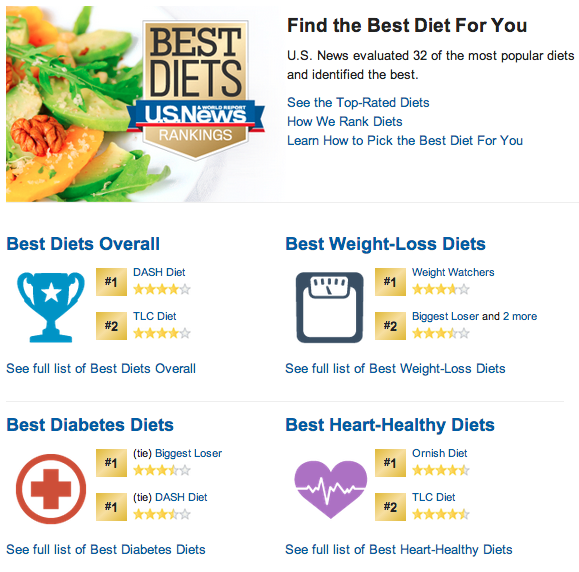Did you see it?
Were you surprised?
I certainly wasn’t.
Quite predictable actually.
Just another example of how major media no longer works for the consumer but instead for the advertisers. They are no longer out to supply us with good high quality, objective, fact based articles but instead will print or post, almost anything to satisfy those who pay their bills…the advertisers. I don’t blame them, its just reality.
For the second year in a row the US News and World Report ranked the Paleo diet dead last in a comparison (albeit an extremely subjective one) of 32 popular diets.
It wasn’t just ranked last, it was ranked behind the Slim Fast Diet and the Medifast Diet, both of which advocate shakes rather than food…hmmm.
Before we get too deep I think its important that we define our terms. What exactly do they mean by the Paleo diet? What ‘version’ of the Paleo diet are they talking about?
One of the great things about the people in the Paleo world (that I just don’t see in many other nutrition camps) is a desire to evolve, to learn more, and to change the recommendations if needed based on new knowledge and science. The result is several different ‘versions’ of the Paleo diet.
Most of the leaders in the Paleo movement have moved towards what they’ve termed a ‘Paleo framework’, using ancestral health as their lens along with the best and latest scientific research to make their recommendations. Its this version of the Paleo diet that is most similar to eating By Design.
Paleo is certainly no longer simply ‘eat what a cave man ate’.
It wasn’t this ‘evolved version of the Paleo diet’ (Eat By Design) that they used in this ‘investigation’ (I put investigation in quotations as it appears very little investigation was actually done). As far as I can tell they are using the original Paleo Diet as published by Dr. Loren Cordain.
Regardless, is the Paleo Diet really that bad?
Lets dissect it.
Here are the criteria they used:
1. Is it easy to follow?.
Easy to follow for who? How and who defined ‘relatively easy’? I find eating By Design extremely easy. I know others find it difficult.
What does that have to do whether a diet is good for you or not?
Food is either good for you or it isn’t. Your body doesn’t care how hard it is to find foods to fulfill its nutrient requirements, nor does it care how much food costs.
2. Is it nutritious?
This is the one that really shows that there was no real attempt to actually research anything.
Please see Prof. Cordain’s paper and Mat Lalonde’s nutrient density work.
I like how Mark Sisson put it best, “By embracing eggs, beef, wild salmon, chicken, lamb, pork, kale, chard, romaine lettuce, spinach, blackberries, blueberries, raspberries, apples, broccoli, sweet potatoes, beets, carrots, oranges, sardines, organ meats, shellfish, fennel, onions, garlic, asparagus, seaweed, butternut squash, yellow squash, zucchini, tomatoes, strawberries, cantaloupe, almonds, macadamia nuts, sunflower seeds, pumpkin seeds, pecans, walnuts, and tuna, you’re at risk of missing out on a lot of nutrients (insert significant sarcasm here).”
Ridiculous.
3. Is it safe?
Again, lets let the science speak for itself.
There have been 8 randomized controlled trials of The Paleo Diet.
The cardiovascular risk factors, satiety, and weight loss indices show the Paleo diet to be superior to diabetic diets, the Mediterranean Diet and to be more trace nutrient dense than the USDA food pyramid. (References are listed below the article.)
4. Is it effective for weight loss?
This one really shows the perspective of the ‘experts’ that were involved.
You can’t grade a diet based on how effective it is for weight loss.
What if you don’t sleep, you’re emotionally stressed, you don’t move, your cortisol (the stress hormone) levels are through the roof, and your body stores fat to help you ‘survive’, yet you eat the ‘perfect diet’ and don’t lose weight. Does that make the diet any less good for you?
That aside, randomized controlled trials of the Paleo diet have shown it works for weight loss. When compared to the Mediterranean diet, the Paleo diet has been shown to be more satiating per calorie. More recently, the same thing happened when they compared a Paleo diet to a standard diabetes diet in type 2 diabetics. Another recent study showed that postmenopausal women eating Paleo lost liver and waist fat, improving their waist-to-hip ratio.
5. Does it have cardiovascular benefits?
US News and World Report excerpt:
“While some studies have linked Paleo diets with reducing blood pressure, bad “LDL” cholesterol, and triglycerides (a fatty substance that can raise heart disease risk), they have been few, small, and short. And all that fat would worry most experts.”
Although you could argue that the sample size was too small to draw conclusions about the population at large these studies that they’ve chosen to discredit clearly show that the Paleo diet can directly cause improvement in cardiovascular disease markers.
So what gives?
Are the experts biased? Of course they are, we all are.
Were they lazy, and fail to do any research? I really don’t know, I just don’t know how else to explain their opinions in light of the available evidence.
One thing is for sure, and that’s their perspective about heath and what they think it means to be healthy. Its quite clear that they define health based on weight, the lack of heart disease and cancer, and most likely the absence of symptoms in general. Essentially, they’re focused on survival.
And that’s where our perspective really differs.
Me personally, I’m not interested in merely being free of symptoms, I want to thrive. I want to be as healthy as humanly possible. I want to get the most out of my body, and ultimately my life.
Are you satisfied with survival? Or are you interested in thriving?
Me too.
That’s why I Eat By Design.
 Dr. Michael Gibson has committed himself to helping others to live the best life possible. After graduating with a Bachelor of Kinesiology from the University of Western Ontario, he received his Doctor of Chiropractic Degree and Masters of Science in Chiropractic Sports Science from Life University. He is the co-creator of Life By Design, owner of The Wellness Group, and co-owner of CrossFit 613. His passion for empowering families runs deep. After experiencing the loss of his sister due to illness, Michael’s purpose became reaching and teaching as many as possible the foundational principles of an extraordinary life. Since that time he has passionately pursued and been successful in living out his dream. He maintains a busy family chiropractic practice, a full speaking schedule and finds time to implement the principles and practices of Life By Design in his own life.
Dr. Michael Gibson has committed himself to helping others to live the best life possible. After graduating with a Bachelor of Kinesiology from the University of Western Ontario, he received his Doctor of Chiropractic Degree and Masters of Science in Chiropractic Sports Science from Life University. He is the co-creator of Life By Design, owner of The Wellness Group, and co-owner of CrossFit 613. His passion for empowering families runs deep. After experiencing the loss of his sister due to illness, Michael’s purpose became reaching and teaching as many as possible the foundational principles of an extraordinary life. Since that time he has passionately pursued and been successful in living out his dream. He maintains a busy family chiropractic practice, a full speaking schedule and finds time to implement the principles and practices of Life By Design in his own life.REFERENCES

